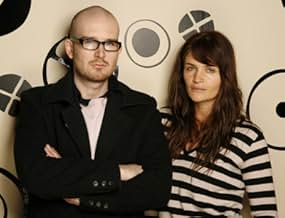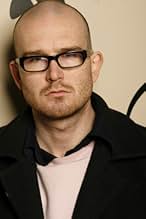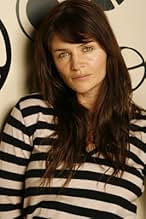Famous pianist Zetterström returns home to his native Denmark, to give a concert, just to find out that the choices he has made in his life have affected his love life greatly.Famous pianist Zetterström returns home to his native Denmark, to give a concert, just to find out that the choices he has made in his life have affected his love life greatly.Famous pianist Zetterström returns home to his native Denmark, to give a concert, just to find out that the choices he has made in his life have affected his love life greatly.
- Director
- Writers
- Stars
- Awards
- 1 win & 6 nominations total
Peder Thomas Pedersen
- Guard 1
- (as Peder Pedersen)
Susanne Storm
- Mor Til Dreng
- (as Susanne Storme)
- Director
- Writers
- All cast & crew
- Production, box office & more at IMDbPro
Featured reviews
Inspired by having seen the provocative Reconstruction last year, I watched Allegro last night and found it to be just spectacular. I think Boe is one of those amazing Renaissance people, whose skills crossover like blossoming fireworks.Above all else, I appreciate his concepts, which become his story lines.Supporting them is his very idiosyncratic visual style. The film is dark and moody, like its protagonist, and there is little dialogue. Long contemplative shots are frequently interrupted by a barrage of split-second images- the equivalent of memory flash cards. The cartoon story that plays during the film's introduction- tells the simple story one is about to see unfold. It's basically a one sentence story about the necessary role that deep feelings play in the life of any great artist. I see that simple story as a spider, and the ensuing film as the web around the spider. I particularly like it that the narrator clearly tells us, at the very beginning, what the film is about, and then we spend the next hours watching that spider web be built and travelled. What a fascinating world Boe creates.
I must say I am very surprised to have not seen much IMDb discussion of this film . I only hope that many more people will soon have the pleasure of its experience.
I must say I am very surprised to have not seen much IMDb discussion of this film . I only hope that many more people will soon have the pleasure of its experience.
I don't understand how the previous reviewer could accuse this film of trying to be too mysterious and of being "overexplained"--these seem inconsistent to me. For my part, I found it straightforward and a bit didactic but I do think the psychological phenomena it pointed to are worth thinking about. Those who remember "Reconstruction" will find this exercise similar in style but less ambitious. It does have its flaws--for example, the devices used to attempt to generate suspense are not very effective. I would say this film succeeds more at getting those in the audience who are attuned to the questions it raises thinking than it does as pure entertainment.
I'm a big fan of existential folly in film, especially having completed many of my own. Zetterstrøm is the main character in this movie, a world-renowned pianist from Denmark. Since childhood, he is an assiduous "forgetter" of everything except his piano playing. This is to say that he stores up his disappointments, forgets them, and retreats behind a piano. After a love affair that ends due to his emotional constipation, he uses his facultative amnesiac skills once again, and this act is one step too far, so inimical to the fabric of reality, that a rent in reality is formed over three city blocks, and becomes referred to as the "Zone".
Zetterstrøm buries himself in his solitary existence of piano-playing, quite literally performing concerts in the dark, or behind screens so that the audience cannot see him. Shadowy figures draw Zetterstrøm back to the zone, unwilling to allow his non-confrontational existence to continue. Zetterstrøm must be made to confront his past.
It's a fascinating film, the narrator lets us know that it's Zetterstrøm's very brilliance which allows him to annihilate himself, that allows him to inoculate himself from reality.
I'm in absolute adoration of films that attempt to make visual metaphors of the human mind, such a film is this (the Zone fulfils this purpose), Tarsem films such as The Cell and The Fall are others. There is no subject more sacred, more revelatory as regards human potential. There's a scene where Zetterstrøm sits and has dinner in an ornately plastered ballroom. The windows and floor are all blacked out with plastic sheeting, and the room is covered in latched boxes loaded on pallets, representing Zetterstrøm's repressed past, there's also a cage with globes of light in, recognising the potentiality of his mind.
When there's narration we also see some very nice cartoons with Zetterstrøm as a child, that's another metaphor I'm very fond of from The Cell, that many of us are still children inside, just wounded, subdued, and with horrid barriers put up. You may have guessed that this movie moved me deeply.
Zetterstrøm buries himself in his solitary existence of piano-playing, quite literally performing concerts in the dark, or behind screens so that the audience cannot see him. Shadowy figures draw Zetterstrøm back to the zone, unwilling to allow his non-confrontational existence to continue. Zetterstrøm must be made to confront his past.
It's a fascinating film, the narrator lets us know that it's Zetterstrøm's very brilliance which allows him to annihilate himself, that allows him to inoculate himself from reality.
I'm in absolute adoration of films that attempt to make visual metaphors of the human mind, such a film is this (the Zone fulfils this purpose), Tarsem films such as The Cell and The Fall are others. There is no subject more sacred, more revelatory as regards human potential. There's a scene where Zetterstrøm sits and has dinner in an ornately plastered ballroom. The windows and floor are all blacked out with plastic sheeting, and the room is covered in latched boxes loaded on pallets, representing Zetterstrøm's repressed past, there's also a cage with globes of light in, recognising the potentiality of his mind.
When there's narration we also see some very nice cartoons with Zetterstrøm as a child, that's another metaphor I'm very fond of from The Cell, that many of us are still children inside, just wounded, subdued, and with horrid barriers put up. You may have guessed that this movie moved me deeply.
It was a big surprise that I gave this movie. When you think because a photograph is more important than a drawing, in the sense that the picture does capture a moment and freeze-it for all eternity, drawing, photography is made stronger, the film exploits this fact into something dramatically essential to put an omnipotent narrator in the argumentation, which is extremely interesting. Note that does not follow the structure of classical cinema, therefore understanding becomes a challenge, challenge for the viewer who expects to have more elements with which to rebuild those gaps that are present in the argument, leading to an environment discomfort that unfortunately tends to boredom. Ulrich Thomsen's performance manages to articulate a meaning of forgetting how wonderful, considering it's not just forgetfulness, but also, hate, despair and love. In history we find characters that make no sense, that seem to abound, or better yet, seems to be missing something, something like the memories of humans, so variable over time, but strongly tied to the music, which is extremely strong important to understand and feel this film.
I have to say that the strength of this movie is it's simplicity. It's beautiful in a very obvious way which really hits you right in the eye. The whole movie has some sort of delicate aura draping it and although the acting, as stated by other reviewers, is not a state of the art, the music and the very beautiful footage makes this a film well worth seeing.
The story is not complicated at all. It uses a lot of symbolism and the movie writer is obviously trying to trigger our imagination by jumping in time and place (in the same style as many filmmakers before him such as Spike Jonze and Michael Gondry) trying to make the moral statement of the film looking more complex than it really is.
This is a beautiful movie, it has some original touches such as the drawn episode and hopefully you will leave the cinema feeling the same way as I did, with a warm feeling inside and the beautiful music still playing in my ears.
The story is not complicated at all. It uses a lot of symbolism and the movie writer is obviously trying to trigger our imagination by jumping in time and place (in the same style as many filmmakers before him such as Spike Jonze and Michael Gondry) trying to make the moral statement of the film looking more complex than it really is.
This is a beautiful movie, it has some original touches such as the drawn episode and hopefully you will leave the cinema feeling the same way as I did, with a warm feeling inside and the beautiful music still playing in my ears.
Did you know
- Quotes
Zetterstrøm: - But what now... now that I regret?
Tom: - It's a bit late for that, I am afraid.
Zetterstrøm: - So, what do I do now?
Tom: - Well, you can go back to your music, if you want.
- ConnectionsReferenced in iChat mellem Boe og Wulff (2006)
Details
Box office
- Budget
- DKK 10,000,000 (estimated)
- Gross US & Canada
- $7,404
- Opening weekend US & Canada
- $505
- May 13, 2007
- Gross worldwide
- $10,208
- Runtime
- 1h 28m(88 min)
- Color
- Sound mix
- Aspect ratio
- 2.35 : 1
Contribute to this page
Suggest an edit or add missing content































